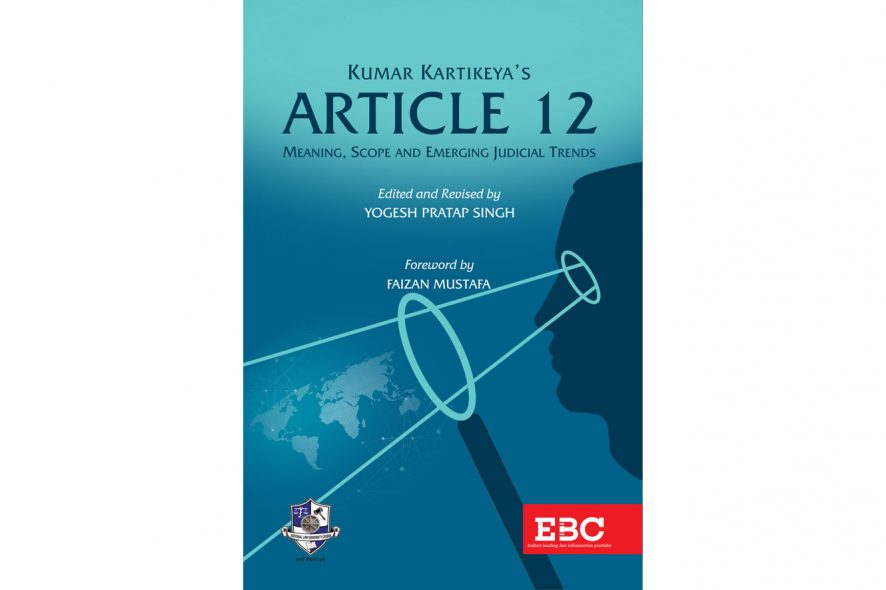Kumar Kartikeya’s Article 12
Overview:
This well-researched work provides an exposition of the judicial interpretation of the concept of “State” in Article 12 of the Indian Constitution. The work gives an in depth insight of the term “State”. The book contains a wealth of information and provides some solutions to vital questions on the concept of ‘State’.
The present work fulfils the void of scholarly literature in this pressing area. The book is a valuable contribution to Indian constitutional literature and a work par excellence. The work is divided into 9 chapters.
Special features:
- Provides a thorough and critical analysis of judicial discourse and literature on ‘State’.
- Addresses the issue with admirable meticulousness and conceptual clarity.
- The work focuses more on what the State implies rather than what it is.
- Author has discussed various types of the Constitutions such as nomadic, nominal and semantic.
- Discusses other pertinent and emerging issues other than fundamental rights and directive principles.
- After a thorough and critical historical examination of the British and US position, the author has made successful attempt to examine the judicial response to the concept of “State” under Indian Constitution.
- This is the only available research work on the subject.
Table Of Contents:
1. INTRODUCTION
2. CONCEPTUALISATION OF STATE AND INFLUENCE OF OTHER CONSTITUTIONS
3. THE CONCEPTUALISATION OF “STATE” VIS-À-VIS FUNDAMENTAL RIGHTS
4. CHANGING JUDICIAL DISCOURSE ON STATE VIS-À-VIS FUNDAMENTAL RIGHTS
5. JUDICIARY AS STATE?
6. THE IDEA OF STATE VIS-À-VIS DIRECTIVE PRINCIPLES OF STATE POLICY
7. THE IDEA OF STATE VIS-À-VIS NON-STATE ENTITIES
8. THE IDEA OF “STATE” IN OTHER PARTS OF THE CONSTITUTION
9. CONCLUSION
About Author
Late Dr. Kumar Kartikeya after completing his BA LLB from University of Lucknow joined the Bar and practiced law for three years. Later, to pursue higher studies in law, he joined National Law School of India University (NLSIU), Bangalore and completed his LLM with specialisation in Business Laws. However, his interest towards academics and particularly in the field of constitutional law forced him to join NALSAR University of Law, Hyderabad. Prior to joining National Law University, Odisha in 2014, he was a part of the KIIT Law School, KIIT University, Bhubaneswar. Kumar completed his PhD from National Law University Odisha on the topic “The Concept of State under the Constitution: A Critical Study of Judicial Response”. He presented numerous papers on constitutional and legal issues at various national and international seminars. Dr. Kumar, a brilliant constitutional law teacher passed away in the year 2014 due to cancer.
“Kumar was a beloved teacher, an astute and brilliant analyst of the law, a promising scholar of immaculate intellectual integrity and a man of absolute generosity and assiduous kindness to all those who worked with him,”. (Dr.) Srikrishna Deva Rao, Vice-Chancellor, National Law University Odisha.
The book provides a thorough and critical analysis of judicial discourse and literature on state. It does go beyond fundamental rights and directive principle and discusses other pertinent and emerging issues. The book does provide an in-depth insight to the concept of State. I am sure that it will be useful for the students of constitutional law, practitioners and researchers. The book contains a wealth of information and provides some solutions to vital questions on the concept of State.from the Foreword by Prof. (Dr.) Faizan Mustafa, Vice-Chancellor, NALSAR.
Buy your copy now, Click on the link available below:






